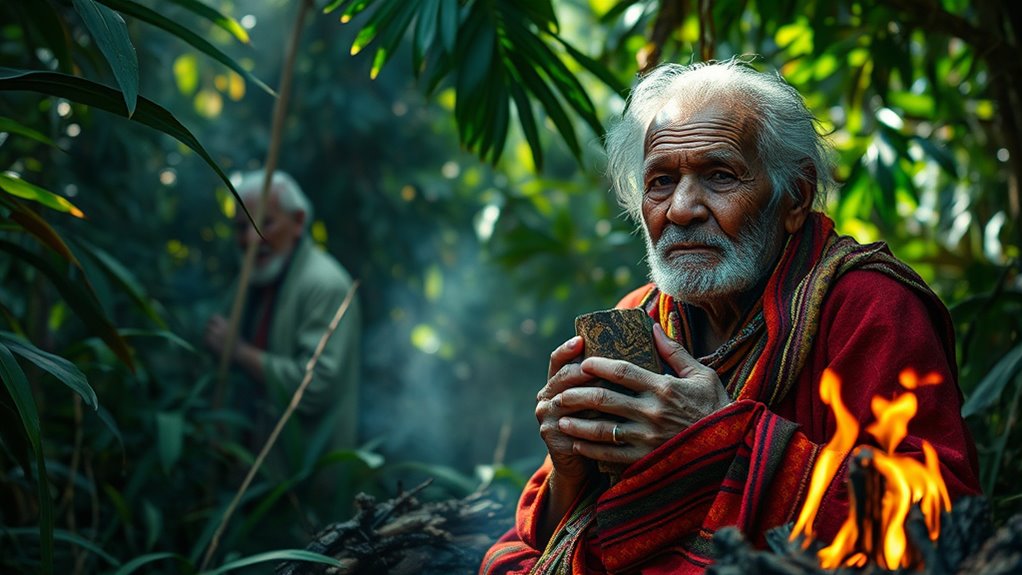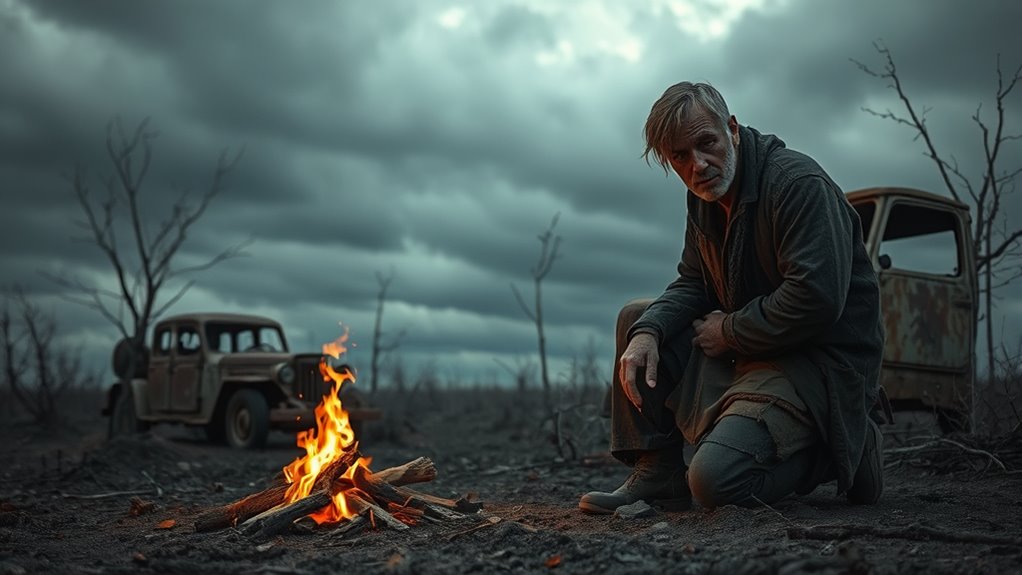In survival moments, your morality is tested as instincts often push you to make tough choices that may seem morally grey. Balancing your will to live with ethical principles involves understanding cultural norms, psychological factors, and legal boundaries. Sometimes, you might act against your morals to ensure your safety or that of others. Exploring these complex scenarios helps you see how morality can shift under extreme pressure—if you keep going, you’ll discover how to navigate these moral gray areas effectively.
Key Takeaways
- Survival ethics often challenge traditional moral boundaries, emphasizing the importance of context and cultural norms.
- Balancing morality and the will to live requires assessing risks, consequences, and personal or cultural values.
- Ethical frameworks like moral relativism and egoism influence decisions, highlighting individual and cultural differences.
- Legal considerations, such as Good Samaritan laws, impact moral choices in survival situations.
- Media portrayals can distort perceptions, underscoring the complexity of moral dilemmas during extreme survival scenarios.
The Foundations of Moral Principles in Extreme Situations

In extreme survival situations, moral principles often come under intense pressure, challenging your usual sense of right and wrong. You might find yourself questioning whether moral relativism—that ethics depend on context—applies or if ethical universalism, which holds certain morals are absolute, should guide your actions. When survival is at stake, these frameworks clash: do you adapt your morals to the circumstances or stick to universal principles? The dilemma becomes whether to prioritize personal morality or a broader sense of right. Your choices reflect deeply held beliefs, but extreme conditions can blur the lines between them. Ultimately, understanding these foundations helps you navigate moral conflicts with clarity, even when survival demands tough decisions that test your core values.
Historical Cases of Survival and Ethical Dilemmas

Throughout history, countless survival stories have posed profound ethical dilemmas that force you to make difficult choices under extreme conditions. In maritime rescues, dilemmas often arise when rescuers must decide whether to risk their lives to save others or prioritize their safety. Similarly, wilderness survival situations challenge you to choose between rationing limited resources or risking exposure to danger. These scenarios highlight tough moral questions: Is it right to sacrifice some to save many? Should you follow strict survival instincts or adhere to moral codes? These cases illustrate that survival isn’t just about physical endurance but also about charting complex ethical landscapes where morality and instinct collide. Incorporating ethical decision-making can help individuals navigate these moral complexities and reinforce personal values during critical moments. Recognizing the importance of moral considerations in extreme situations can guide better decision-making and promote resilience, especially when faced with prophetic dreams that may influence perceptions of destiny and morality.
Psychological Perspectives on Survival Instincts and Morality

When faced with life-threatening situations, your survival instincts kick in, often guiding your immediate actions. This instinctual behavior is rooted in psychological resilience, helping you endure extreme stress. Your mind rapidly assesses threats, prioritizing safety and survival over morality. Understanding this, you can see how instincts influence decisions that might conflict with your moral values. Factors like fear, adrenaline, and past experiences shape your responses. Recognizing these psychological processes helps clarify why you might act against your ethical beliefs under pressure. The contrast ratio of the situation can influence the clarity of your perceptions, impacting decision-making under stress. Additionally, the availability of essential survival gear can significantly affect your ability to respond appropriately during crises. The performance of safety equipment plays a crucial role in ensuring survival in dangerous scenarios. Insights from cultural intelligence research reveal that cultural background can shape survival strategies and ethical considerations in extreme conditions. Recent advances in AI-driven discoveries have also begun to influence our understanding of human behavior in survival contexts, shedding light on how technology can assist or complicate decision-making.
Philosophical Theories on Ethics and Survival Choices

Philosophical theories offer diverse perspectives on how ethics intersect with survival choices, especially in life-or-death situations. Ethical egoism suggests that your primary moral obligation is to prioritize your own survival and well-being, even if it means making harsh decisions. This view justifies actions that serve your self-interest, regardless of societal norms. On the other hand, moral relativism argues that survival ethics depend on cultural or personal beliefs, meaning what’s right in one context might be wrong in another. You’re encouraged to contemplate these frameworks when faced with survival dilemmas, understanding that ethical egoism focuses on self-interest, while moral relativism emphasizes context and cultural differences. These theories challenge you to reflect on whether survival justifies moral boundaries or if morality remains fixed.
Cultural Variations in Survival Ethics

Your understanding of survival ethics changes when you consider how different cultures define morality and acceptable behavior in extreme situations. You’ll notice that taboo and ethical boundaries vary widely, shaping what communities see as justifiable. Exploring survival rituals reveals how cultural practices influence decisions made under life-and-death circumstances. Additionally, vetted products for newborn care demonstrate the importance of safety and thoughtful choices in critical moments. Recognizing the role of arcade machines in cultural entertainment highlights how recreational practices can reflect and influence societal values during crises. Moreover, understanding the best vacuum cleaners for hardwood floors underscores the significance of appropriate tools and methods for maintaining hygiene in challenging conditions. Incorporating payment security measures can also be crucial to protect transactions when resources are scarce, emphasizing the importance of cybersecurity even in survival scenarios. Considering food safety rules for cooking raw chicken illustrates how proper practices can prevent illness, which is vital in survival scenarios.
Cultural Norms and Morality
Cultural norms deeply influence how societies define morality in survival situations, shaping what behaviors are deemed acceptable or unacceptable. These norms can lead to cultural marginalization of certain practices or beliefs, especially when they clash with mainstream values. You might find that societal conformity pressures individuals to act in ways that align with their community’s expectations, even if it conflicts with personal morals. Different cultures prioritize survival ethics differently, emphasizing loyalty, individualism, or collective well-being. This variability affects decisions during crises, where what’s seen as ethical in one society could be taboo in another. Additionally, Cultural Intelligence (CQ) can play a crucial role in understanding and navigating these differing moral frameworks during survival scenarios. Recognizing cultural variations in survival ethics can help individuals better adapt their actions to diverse moral expectations in critical situations. Understanding cultural norms related to morality can also aid in avoiding misunderstandings or conflicts in multicultural survival contexts. Awareness of cultural adaptability is vital for making ethical choices that respect diverse moral standards while ensuring survival. For example, familiarity with moral relativism allows individuals to appreciate why certain actions are permissible in one culture but not in another, fostering empathy and better decision-making.
Taboo and Ethical Boundaries
Taboos and ethical boundaries vary widely across cultures, shaping how survival situations are traversed. In some societies, breaking a taboo might be seen as a necessary act for survival, even if it violates moral boundaries. Others uphold strict limits, viewing any taboo breaking as morally unacceptable, regardless of circumstances. These cultural differences influence decisions during crises, where some may justify actions like consuming forbidden foods or breaking social rules to stay alive. You must recognize that what’s considered morally permissible in one culture could be taboo in another. Understanding these variations helps you appreciate the complex ethical landscape faced in survival situations, where traversing taboo breaking becomes a delicate balance between moral boundaries and the instinct to survive. Additionally, the presence of eye patches in self-care routines highlights how individuals seek immediate relief and comfort in stressful scenarios, which can influence decision-making in survival contexts. Recognizing the importance of cultural context in shaping ethical choices can aid in navigating moral dilemmas when survival depends on breaking or adhering to social norms. Furthermore, cultural influences can affect perceptions of family dynamics, which may play a critical role in decision-making during life-threatening situations. Incorporating an understanding of privacy policies and data collection practices can also be surprisingly relevant, as access to external support or information during crises may be limited by such boundaries. For example, knowledge about regional culinary traditions can impact choices related to survival foods, especially when cultural identity is closely tied to food practices.
Survival Rituals and Practices
In survival situations, practices and rituals often reflect the values and beliefs of a community, influencing how people respond to extreme challenges. These cultural practices shape survival rituals, guiding behavior when stakes are high. For example:
- Rituals that honor ancestors to seek guidance or protection
- Use of traditional medicines or herbal remedies
- Group ceremonies to boost morale and unity
- Sacrificial offerings to appease spirits or deities
- Storytelling to pass down survival knowledge and ethics
These cultural practices provide a framework for making ethical decisions under duress, blending morality with survival instincts. They reinforce community bonds, establish shared norms, and often determine what is considered acceptable or taboo in life-and-death moments. Your understanding of these rituals reveals how deeply culture influences survival ethics. Additionally, understanding the spiritual significance of Hopi ceremonies can offer insights into how rituals serve as a means of maintaining harmony with nature and the universe during critical times.
Legal Implications of Survival Decisions

When making survival decisions, you may face legal consequences that can complicate your situation further. Your choices could lead to liability issues if authorities or others question your actions. For example, rescuing someone in danger might be legally protected, but causing harm or neglect could result in charges. It’s crucial to understand the legal boundaries you operate within during emergencies. Here’s a quick overview:
| Scenario | Potential Legal Consequences | Liability Issues |
|---|---|---|
| Saving a stranded hiker | Usually protected under Good Samaritan laws | Liability for accidental injury |
| Taking supplies from others | Could be theft; legal repercussions | Moral vs. legal obligation |
| Making life-or-death decisions | Risk of criminal charges or lawsuits | Responsibility for outcomes |
Knowing these can help you navigate survival ethically without risking legal trouble.
Modern Media and Public Perception of Survival Ethics

Modern media plays a powerful role in shaping how the public perceives survival ethics, often highlighting dramatic decisions and moral dilemmas in extreme situations. Your perception of what’s right or wrong in survival scenarios is heavily influenced by media influence, which tends to dramatize choices and consequences. Public opinion is shaped by these portrayals, sometimes oversimplifying complex moral questions. You might see stories that emphasize heroism or villainy, swaying your view of survival ethics. Media coverage can create moral judgments based on limited information, leading to misconceptions. Keep in mind that these narratives often lack context, influencing societal attitudes toward survival decisions. Understanding this media influence helps you critically evaluate public debates on survival ethics instead of accepting sensationalized stories at face value.
Navigating Moral Gray Areas in Life-and-Death Scenarios

Media portrayals often simplify complex moral decisions in survival situations, but real-life choices rarely fit into clear-cut categories of right and wrong. When facing life-and-death dilemmas, you must navigate moral gray areas where moral relativism plays a role—what’s acceptable in one context might be unacceptable in another. Ethical pragmatism becomes vital, guiding you to prioritize actions that maximize survival and minimize harm, even if they challenge traditional morals. You might grapple with decisions like sacrificing one person to save many or bending rules to ensure safety. In these moments, understanding that morality isn’t absolute helps you evaluate options more realistically. Ultimately, balancing moral relativism with pragmatic considerations allows you to make difficult choices with clarity amid uncertainty.
Frequently Asked Questions
How Do Personal Biases Influence Survival Moral Decisions?
When facing survival decision dilemmas, your personal biases influence how you weigh options and make choices. Bias influence can cloud judgment, making you prioritize certain lives or outcomes over others based on your beliefs or emotions. These biases shape your moral decisions, sometimes leading you to act in ways that conflict with objective morality. Recognizing your biases helps you understand their impact and make more balanced, ethical decisions during critical moments.
Can Survival Ethics Differ Across Different Religious Beliefs?
You might notice that survival ethics can vary greatly across different religious beliefs because religious doctrines shape what’s considered morally acceptable. Cultural norms also influence these decisions, guiding how individuals prioritize survival versus moral principles. In some traditions, preserving life aligns with spiritual teachings, while others emphasize moral duties regardless of circumstances. These differences show how religion and culture deeply impact how you approach survival dilemmas.
What Role Does Empathy Play in Survival Situations?
Empathy acts as your moral compass, guiding you through stormy survival seas. It helps you connect emotionally with others, fostering compassion amid chaos. When faced with moral dilemmas, empathy boosts your emotional resilience, making tough choices more humane. You become more aware of others’ suffering, which can inspire selfless acts. In survival situations, empathy isn’t just a feeling; it’s an essential tool that keeps your humanity intact while steering through life-or-death challenges.
Are There Universal Moral Standards in Life-And-Death Choices?
When facing life-and-death choices, you might wonder if universal moral standards exist. You could see morality as shaped by moral relativism and ethical subjectivity, meaning what’s right varies across cultures and situations. In critical moments, you may find that personal values and circumstances influence your decisions more than any fixed moral rule. Ultimately, you may believe that moral flexibility helps you navigate complex survival dilemmas, rather than strict universal standards.
How Does Societal Pressure Affect Individual Survival Ethics?
When it’s a matter of life and death, societal pressure can be a double-edged sword. Peer pressure and cultural norms often push you to conform, even when your instincts say otherwise. You might feel trapped between doing what’s right and what’s expected. Remember, you can’t always judge a book by its cover, but understanding these influences helps you navigate survival ethics better and make choices true to yourself.
Conclusion
In the end, when survival’s on the line, you might find yourself juggling morality like a hot potato—except the potato’s a ticking time bomb. Society’s rules? Gone. Your conscience? Scrambled eggs. So, next time life throws you into the moral meat grinder, remember: you’re not just fighting for survival, you’re auditioning for the role of humanity’s most hilarious moral contortionist. Bon appétit—if you survive to enjoy it.










